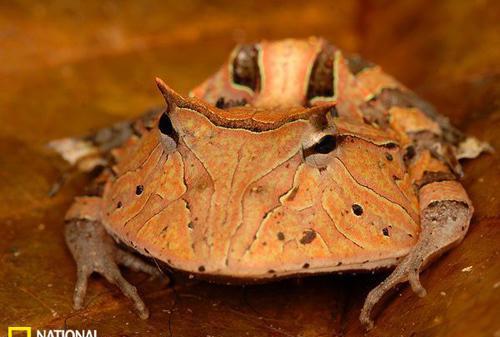In order to better protect the balance of the natural ecological environment, we must know which species, how do they survive, and how can we better protect them? Conservation International, a world-renowned animal protection organization, has discovered many new species that were previously unknown in the rainforests of South America.
New species: Suriname horned frog
Scientists have discovered a Surinamese horned frog this time, and its predation method is simply: "waiting for the rabbit". Its unusually wide mouth allows it to effortlessly swallow prey almost the size of its body, including rats and other frogs.

New species: cowboy frog
This peculiar frog is one of 46 suspected new species that scientists have found in the dense forests of the small South American country of Suriname. The heel of this frog has become a thorn, so calling it "cowboy frog" is really worthy of its name.
New species: Glittering dragon lice
The aquatic beetle, which is all-turquoise, was found in Venezuela and is very similar to the new species discovered during a recent RAP expedition to Suriname.
New species: the mouth-licking gecko
A gecko is sticking out its tongue and licking its eyes, also discovered during this Suriname forest expedition. Like other geckos, this gecko has a vertical pupil orientation and no eyelids, so they must replace the eyelids with their tongues.
New species: The Thousand Colored Ant
This may also be a new species, which was discovered on a leaf during a Surinamese RAP expedition. This small insect lives mainly in the central and southern parts of South America. It's called the "Thousand Colors" Ant, and it lives up to its name: scientists describe it as having "amazing colors." They are also the only known species of ant that uses "chemical weapons" to fight birds or reptile predators.
New species: Catfish
It is a suspected new species of catfish with long spines on its body to resist the attack of piranhas (piranha). The local guide originally planned to eat such a catfish as a good meal. But the scientists intervened and collected the fish as a specimen.
New species: Cone-headed ant
This is a rare cone-headed ant, which was first found in the Amazon rainforest in Peru, and in this expedition it was confirmed that it also lives in the rainforests of Suriname, a discovery that greatly expands the habitat range of this species. In such a rainforest expedition, all kinds of insects can be seen everywhere, and scientists are almost overwhelmed. Larson wrote in his field trip diary: "The first night I went into my tent and was surprised to find that my sleeping bag had been occupied by a bullet ant. It's a huge ant, and if bitten by it, the severe pain can last even 24 hours. ”
New species: carnivorous catfish
The catfish may belong to a new species of the genus Pterodoras, which was discovered at night. It was hiding under a reef in the middle of the river. According to Conservation International, the predator, which is about 60 centimeters long, would "eat almost anything that gets in its mouth."